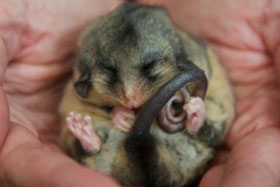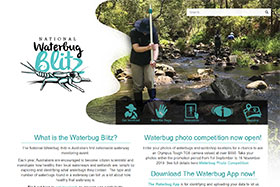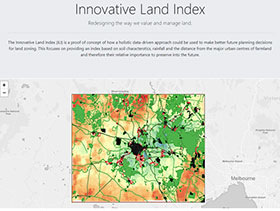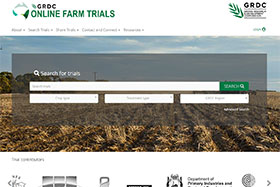
CeRDI Newsletter Spring 2019
In this issue:
- Message from the Director
- Citizen science project tracking moths for mountain pygmy possum survival
- Agricultural Research Federation (AgReFed) formed
- International and national AgReFed presentations
- National Waterbug Blitz progress
- GovHack 2019 winners
- Better Fertiliser Decisions for Cropping in Australia: An audit
- Successful PhD examination
- Staff Profile: Dr Judi Walters
- Student Profile: Dr Rekha Attanayake
- Student Profile: Rob Clark
- CeRDI news snippets
- CeRDI postgraduate news
- About CeRDI
- Contact CeRDI
Message from the Director
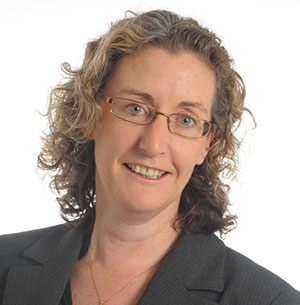 |
|
|
Associate Professor: |
Many of the projects showcased in this issue of the newsletter demonstrate CeRDI’s continued contribution in natural environment and agricultural research. These areas represent two of the six thematic research areas at CeRDI.
Our natural environment theme, spearheaded by a dedicated team of researchers, ecologists and technology professionals, is delivering important conservation projects that are complemented by technology innovations. Recent examples of this include two citizen science projects that have received much attention in the state and national media. The Moth Tracker project with Zoos Victoria, and the National Waterbug Blitz are exemplars of the work that CeRDI is undertaking to support conservation, natural resources, and the environment through research and the use of technology. These projects represent two of the many unique projects that CeRDI is conducting in this area (https://www.cerdi.edu.au/NaturalEnvironment).
Supporting and advancing eResearch within the agriculture domain remains a focus of CeRDI research (https://www.cerdi.edu.au/Agriculture). The projects featured in this newsletter represents a small but significant selection of the many current agricultural projects that CeRDI is leading, and collaborating on. CeRDI has led the establishment of the Agriculture Research Federation (AgReFed); the aim of which is to deliver a shared approach between data provider communities for Findable, Accessible, Interoperable and Reusable (FAIR) agricultural data with the flow-on benefits of improving profitability and sustainability for Australia’s agricultural sector. Another example is the recent review conducted for NSW Department of Primary Industries and other stakeholders of Better Fertilizer Decisions in Cropping database.
Citizen science project tracking moths for mountain pygmy possum survival
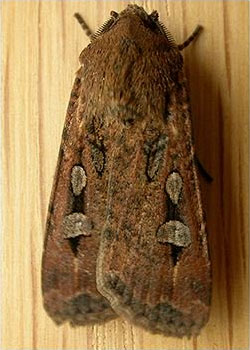 |
|
|
Bogong moths are an |
|
CeRDI is collaborating with Zoos Victoria on an important project: a citizen science application to support research and conservation efforts to aid the mountain pygmy possum. The Moth Tracker web application is used to track Bogong moths which are an essential food source for the possums.
Bogong moths are an important food source for mountain pygmy possums when they wake from their annual hibernation. In recent years, moth populations have declined, posing a threat to this tiny marsupial’s survival. Tracking Bogong moths using sightings uploaded by the public – citizen scientists – during the seasonal migration of moths from Queensland, New South Wales and western Victoria to the alpine region, is essential. The moth data collected using the Moth Tracker application will be used by researchers to understand moth migration, and assist in identifying factors that may be influencing their declining population and what this then means for the survival of mountain pygmy possums.
CeRDI has led the development of technologies to support a number of citizen science initiatives. The new Bogong moth sightings application, hosted on the State Wide Flora and Fauna Teams (SWIFFT) website has been designed to be easy and quick to use and optimised for mobile devices.
A fundamental element of citizen science is the opportunity it provides for members of the public to take up an active role in research and innovation. With the help of the general public, photos and sightings of the moths are being contributed during the migration season, uploaded and stored using a format that ensures the data can be exchanged with other databases and technology platforms as required.
Agricultural Research Federation (AgReFed) formed
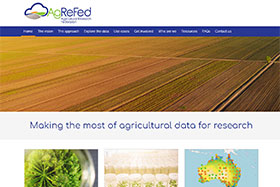 |
|
|
Agricultural Research Federation (AgReFed) |
The emergent agricultural data sharing ecosystem in Australia is generally ad hoc and siloed, meaning that much of the potential value of agricultural data for research is not being fully realised.
Led by CeRDI, Federation University, together with collaborators at CSIRO Environmental Informatics, the Agricultural Research Federation has now been enacted. The Agricultural Research Federation (AgReFed) is a cooperative of Data Provider Communities with the shared vision: “To enable FAIR agricultural data to accelerate innovation in and increase profitability and sustainability of Australian agriculture”.
Through a transformative collections ‘Discovery Activities’ grant funded by National Collaborative Research Infrastructure Strategy (NCIS) through the Australian Research Data Commons (ARDC), AgReFed transitioned from a group of agricultural research data providers delivering FAIR data to a discovery portal, to a scalable, federated data provider community.
International and national AgReFed presentations
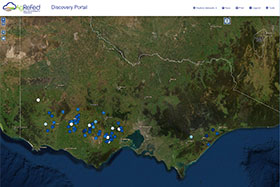 |
|
|
AgReFed Discovery Portal |
In September, the work of AgReFed was presented by Paul Box from CSIRO Environmental Informatics at CODATA, China, with the title, Towards Next-Generation Data-Driven Science. Paul presented the governance and data stewardship framework for FAIR agricultural data, with the case study being the Agricultural Research Federation (AgReFed), an Australian research infrastructure case study. Funded by National Collaborative Research Infrastructure Strategy (NCRIS) through the Australian Research Data Commons (ARDC), the framework developed and enacted can be viewed at https://doi.org/10.25919/5cf179ba35db9.
In October, researchers gathered at the Australian Research Data and Services Summit in Brisbane. The aim of this summit was to bring together stakeholders interested in developing a more coherent national data system. Setting the context for discussions were the findings presented by researchers, groups and service providers that participated in the Data and Services Discovery Activities supported by the NCRIS, through the Australian Research Data Commons. This was followed by the eResearch Australasia conference.
National Waterbug Blitz progress
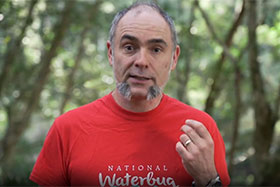 |
|
|
Youtube video: National Waterbug Blitz - |
The National Waterbug Blitz, a project coordinated by CeRDI’s Dr Birgita Hansen in partnership with Waterwatch, Corangamite CMA, Envirocomm Connections and The Waterbug Company, has recently commenced Australia’s second nationwide waterway monitoring event. This unique citizen science event is helping to assess the health of the nation’s waterways by exploring and identifying what aquatic macroinvertebrates (“waterbugs”) they contain.
This three-month long water monitoring event is the culmination of extensive work by the project team to ensure uptake and involvement by citizen scientists and members of the wider community. To facilitate this, a series of short videos have been produced that are available on the project website (https://www.waterbugblitz.org.au/Resources). These step-by-step ‘know how’ videos provide community members with information about the project, showcasing effective methods to support waterways monitoring through the collection, sorting and identification of waterbugs in local waterways.
GovHack 2019 winners
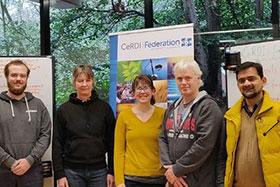 |
|
|
The winning CeRDIfy team members: L-R: |
Members of the CeRDI team recently participated in GovHack 2019 and developed the Innovative Land Index. This entry was announced as the Victorian winning entry for the Visualising the Soils category. The awards were announced at the GovHack event in Melbourne on 12 November 2019.
GovHack is an annual, international competition, focussing on open data projects that are developed in teams and presented in the course of a 46-hour event. A free, inclusive and all ages hackathon, its aim is to see inventive, problem-solving applications of open government data sets. The competition has proven to be a great forum for launching data initiatives, with the 2014 winning entry RainParrot going on to become a top-selling weather app.
This year’s Ballarat event was held at the Ballarat Tech School at Federation University’s city (SMB) campus, providing participants with open areas and breakout spaces to work dynamically in teams. A five-person team from CeRDI, known as ‘Team CeRDIfy', presented their concept for a future planning and land zoning tool at the GovHack 2019 event in early September. The CeRDIfy team was led by Technical Assistant Dan Ferguson together with Dr Angela Neyland (GIS analysis and video editing), Dr Basharat Ali (research), Chris Bahlo (research) and Derek Walters (research).
Better Fertiliser Decisions for Cropping in Australia: An audit
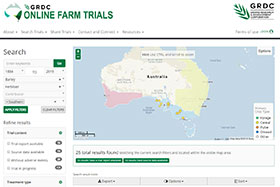 |
|
|
The Online Farm Trials (OFT) platform |
CeRDI Senior Research Fellow, Dr Nathan Robinson, with Paul Feely, Bruce Simons, Andrew MacLeod, and Megan Wong recently completed an audit of the Better Fertiliser Decisions for Cropping in Australia (BFDC) database and online data entry tool. Commissioned by the NSW Department of Primary Industries (DPI) together with the Grains Research and Development Corporation (GRDC), the aim of the audit was to identify future improvements through a series of recommendations to enhance to utility of BFDC in improving profitability and productivity of Australian grain growers.
Six main areas were established as the basis for the audit of the BFDC website. This included database structure and extensibility, data persistence, compatibility, and accessibility, data entry and other contributory data. Outcomes from the audit also included an assessment of, and guidelines for how to support and adapt the BFDC database to adopt and incorporate the FAIR data principles. These principles are the tenets under which research data is made more Findable, Accessible, Interoperable and Reusable.
Successful PhD examination
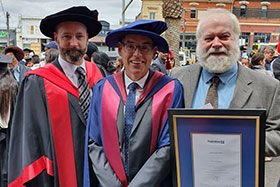 |
|
|
Dr Harpreet Kandra, Dr David Ebbs |
Congratulations to Dr David Ebbs who has successfully completed his PhD.
David commenced his PhD studies with CeRDI in 2015, under the supervision of Associate Professor Peter Dahlhaus, Dr Andrew Barton and Dr Harpreet Kandra. During his time as a full time student, David worked part-time in CeRDI. David has published widely from his research and has presented at industry conferences, both nationally and internationally. During 2018, David participated in an internship with City West Water, though the Australian Postgraduate Research (APR) Intern program.
David was awarded his degree during the recent Federation University graduation ceremonies in December.
Staff profile: Dr Judi Walters
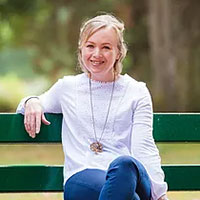 |
|
|
Dr Judith Walters |
Judi joined the team at CeRDI in 2015 working on the Online Farm Trials project after moving to the Ballarat area after eight years living in the Dandenong Ranges. Having grown up in north-east Victoria, Judi studied for her undergraduate degree at The University of Melbourne, gaining a Bachelor of Forest Science (with Honours) before moving to southern Queensland to undertake a Masters (by research) at the Queensland Forestry Research Institute through The University of Queensland. This work focussed on the influence of forest structure on the regeneration of local eucalypt species.
Following graduation, Judi was awarded a scholarship from the Victorian Department of Natural Resources and Environment to conduct a PhD at the University of Melbourne’s newly formed School of Forest and Ecosystem Science, where she combined field-work with glasshouse and laboratory experiments to determine the dynamics of carbohydrate reserves during sprouting from Eucalyptus obliqua L'Hér. lignotubers. After graduating, Judi then completed a post-doc with the Bushfire CRC before joining CSIRO Publishing as the Production Editor for Functional Plant Biology and Australian Systematic Botany: Judi continues to work in the journals team for CSIRO Publishing on a part-time basis.
Student Profile: Dr Rekha Attanayake
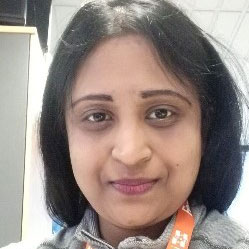 |
|
|
Dr Rekha Attanayake |
|
Dr Rekha Attanayake recently enrolled in a PhD program at CeRDI, under the supervision of Prof Peter Dahlhaus (principal supervisor) and Dr Nathan Robinson (co-supervisor) in a lime soil acidity project funded by the National Landcare Program (in a project led by Southern Farming Systems). In this project, Rekha will explore and develop novel approaches to advance understanding of lime type, quality, variability and spreadability on performance for agricultural purposes under current farming systems and practices. The outcome of the project will be used to co-develop an online tool for comparison of lime applications, taking into account the lime quality, availability, crop or pasture response, and economics.
Rekha migrated to Australia in August 2018, after pursuing her PhD in crop Science from the University of Peradeniya. Her thesis was focused on molecular and biochemical analysis of pomegranate (Punica granatum L.) at different maturity stages and grown under different environmental conditions. Prior to her PhD, Rekha obtained her BSc Agriculture and MSc in Agricultural Microbiology degrees in 2007 and 2010 respectively. Her MSc thesis was on “Effect of bio-fertilizers, inorganic fertilizers and compost mixtures on the growth of coconut seedlings, nutrient availability and soil microbial interactions”.
Student Profile: Rob Clark
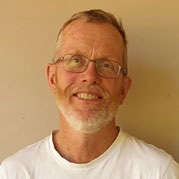 |
|
|
Rob Clark |
|
Rob commenced his PhD at CeRDI in September 2019. The aim of his research is to develop a prediction algorithm that will produce accurate, robust crop yield estimates at a sub-paddock scale within the growing season for the main commercial broad acre crops. The prediction algorithm will need to account for variation caused by the different climatic zones, soil types and farming systems that occur across a variety of cropping regions and across different seasons. Predictions will be based on a range of publicly available data sets including satellite imagery, landscape metrics, soil moisture estimates, digital soil data and meteorological data. The research will apply a selection of multi-variate statistical analysis and machine learning techniques to the remotely sensed imagery, soil data, climate data and landscape metrics. Yield data collected by farmers and service providers at harvest will be used to develop and calibrate the prediction algorithms and test their accuracy. It is intended to utilise eResearch tools and techniques to identify potential sources of legacy ground truth data, analyse and process the data and to publish any new data sets developed in the course of the research project.
Rob was born in Melbourne and graduated from RMIT with a Diploma of Applied Science in Surveying in 1977. He has lived in Bendigo since 1983 and in 2004 gained a Graduate Diploma of Applied Science (GIS and Remote Sensing) from Charles Sturt University in Wagga.
CeRDI news snippets
 |
|
|
Above: A copy of Nathan’s poster from |
Soil Organic Matters Conference
CeRDI’s Dr Nathan Robinson and higher degrees by research student, Dr Basharat Ali, both attended the Soil Organic Matters Conference (SOM) in Adelaide in early October. Nathan presented a poster at the conference, which highlighted the research conducted from three separate surveys on high performance soils.
The surveys were undertaken through research projects supported by the Soil Cooperative Research Centres (www.som2019.org/wp-content/uploads/2019/10/Poster-Presentation-Abstract-Book.pdf). Basharat participated in the learning opportunities through attendance at presentations and networking events for ideas exchange to inform his PhD research. Basharat also co-chaired an event session with Professor Brian Wilson from the University of New England.
Keynote presentation
Dr Birgita Hansen recently gave a keynote presentation to a large group of local residents, members and council and CMA representatives, during a day of celebrations to commemorate the 10-year anniversary of the Yatmerone Reserve, Penshurst. Birgita presented a detailed outline of her Latham’s Snipe research. Birgita also announced that a small paddock in Penshurst had become site of national significance following a bird survey conducted by the Friends of Yatmerone Reserve.
CeRDI postgraduate news
.png) |
|
|
Citizen Science Association, |
|
Presentation - Australian Citizen Science Association:
Victorian Chapter: PhD student Pat Bonney recently participated in, and was a guest speaker, at the October meeting of the Australian Citizen Science Association Victorian Chapter workshop. The theme of the meeting was creating great citizen science projects. Along with two other speakers at this event, Pat presented insights from his PhD research with a focus on the futures of freshwater citizen science in Australia. Pat’s PhD research is examining the potential for citizen science to enable meaningful connections between community and waterway governance. Pat is a general committee member and student member for the Australian Citizen Science Association, Victorian Chapter.
|
|
About CeRDI
The Centre for eResearch and Digital Innovation (CeRDI) is a research centre at Federation University Australia focused on:
- the application of information and communications technology (ICT) and the development of innovative, world class knowledge management systems;
- significantly advancing the digital literacy and knowledge management capabilities of partner organisations;
- fostering partnerships for the development and implementation of eResearch with industry, government and academia; and
- measuring the impact of eResearch and digital innovation through longitudinal research.
Contact CeRDI
For further details about CeRDI’s diverse portfolio of research please visit our website: www.cerdi.edu.au, or contact Director, Associate Professor Helen Thompson: h.thompson@federation.edu.au
Mailing Address
Centre for eResearch and Digital Innovation
Federation University Australia
PO Box 691
Ballarat Vic 3353
Office Location
Suite 15, Greenhill Enterprise Centre
Ballarat Technology Park
University Drive
Mount Helen Vic 3350
Phone: +61 3 5327 9314
Email: support@cerdi.edu.au
Subscribe to the CeRDI Newsletter Mailing List
I would like to subscribe to the CeRDI Newsletter Mailing List to receive notifications of future CeRDI Newsletters.
If you have any feedback, please email newsletter@cerdi.edu.au

